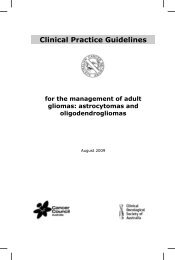Clinical Practice Guidelines for the management of locally advanced ...
Clinical Practice Guidelines for the management of locally advanced ...
Clinical Practice Guidelines for the management of locally advanced ...
Create successful ePaper yourself
Turn your PDF publications into a flip-book with our unique Google optimized e-Paper software.
<strong>the</strong>rapy since such studies would be unethical. ADT is an effective <strong>the</strong>rapy <strong>for</strong> metastatic disease<br />
(albeit temporarily) and patients can be salvaged at <strong>the</strong> time <strong>of</strong> symptomatic progression.<br />
Evidence summary Level References<br />
The limited data suggest patients with asymptomatic metastatic<br />
prostate cancer are not advantaged by early androgen<br />
deprivation <strong>the</strong>rapy until symptomatic progression.<br />
Recommendation<br />
II 15, 16<br />
Androgen deprivation <strong>the</strong>rapy is indicated <strong>for</strong> metastatic prostate cancer. Immediate<br />
<strong>the</strong>rapy is warranted <strong>for</strong> symptomatic metastases. The evidence <strong>for</strong> immediate <strong>the</strong>rapy <strong>for</strong><br />
asymptomatic metastases is unclear, but it is definitely warranted if delay may result in<br />
complications (eg spinal cord compression from vertebral metastases).<br />
Grade C<br />
A decision about whe<strong>the</strong>r to defer <strong>the</strong>rapy <strong>for</strong> patients with asymptomatic metastases will be a<br />
discussion between patient and physician. Patients will require close follow-up if <strong>the</strong>rapy is deferred.<br />
Close evaluation would include an MRI <strong>of</strong> <strong>the</strong> spine <strong>for</strong> patients with documented but asymptomatic<br />
vertebral metastases to ensure <strong>the</strong>re is no pending spinal canal encroachment which would necessitate<br />
more urgent treatment. 17<br />
5.1.4 Toxicity<br />
Numerous trials examining hormone <strong>the</strong>rapy as a treatment <strong>for</strong> metastatic disease reported adverse<br />
events and toxicities. Many included patients without clinical metastatic disease and as a result patient<br />
populations were <strong>of</strong>ten markedly heterogeneous. Fur<strong>the</strong>rmore, <strong>the</strong> duration <strong>of</strong> follow-up ranged from<br />
less than six months to many years and, in a number <strong>of</strong> studies, this was unclear. Finally, as with <strong>the</strong><br />
trials <strong>of</strong> ADT <strong>for</strong> non-metastatic disease, most <strong>of</strong> <strong>the</strong>se RCTs had <strong>the</strong> limitations <strong>of</strong> focusing on<br />
efficacy outcomes ra<strong>the</strong>r than toxicities with adverse events. The latter were rarely comprehensively<br />
recorded and evaluated rigorously and so are potentially understated. A final concern is that many<br />
studies were sponsored by <strong>the</strong> pharmaceutical industry and this may have introduced a bias.<br />
Early versus delayed androgen deprivation<br />
There were three RCTs comparing immediate castration with delayed treatment that included patients<br />
with metastatic disease. Two <strong>of</strong> <strong>the</strong>se studies included patients with M0 disease and <strong>the</strong> third was a<br />
M1 subgroup analysis. Two examined cardiovascular mortality and one examined haemoglobin<br />
levels. Castration did not significantly increase cardiovascular mortality 15, 16, 18 , however it did cause a<br />
significant decrease in haemoglobin levels. 19<br />
CAB versus mono<strong>the</strong>rapy<br />
As cyproterone acetate is not recommended <strong>for</strong> first-line ADT by <strong>the</strong> UK Committee on <strong>the</strong> Safety <strong>of</strong><br />
Medicines and in <strong>the</strong> ASCO <strong>Guidelines</strong>, this medication was not considered.<br />
53<br />
Overt metastatic disease and/or loco-regional progressive disease



